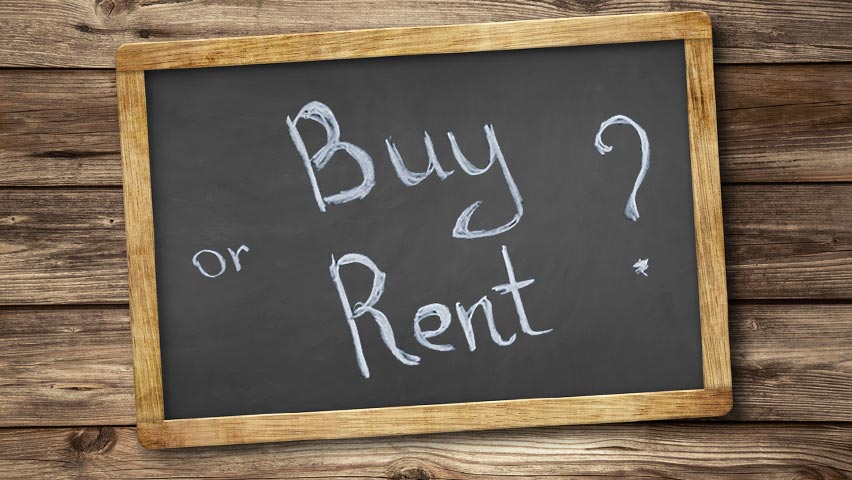Homeownership Versus Renting
Becoming a homeowner can feel like a right of passage—a shift to a more adult-like adulthood. But it’s also not the right move for everyone, and the benefits of owning a home don’t always outweigh the costs.
Deciding what’s right for you will partially depend on your finances, but there’s more to consider. Where you currently live, when you’ll likely move next, and the amount of risk and responsibility you want to take on all factor into the decision.
Learn more about the pros and cons of owning and renting, and how to get started if you decide homeownership is right for you.
Homeownership: Pros and Cons
Owning a home can be a fulfilling and financially rewarding decision. However, there’s no reward without risk, and it could also become a time-consuming and costly mistake.
Pros
- You can customize your living space however and whenever you’d like, which might lead to a more comfortable and fulfilling at home experience.
- Your monthly mortgage payments build equity (i.e., ownership) in the home rather than lining a landlord’s pockets. You may also receive a tax benefit from paying interest on your mortgage.
- Becoming a homeowner can offer financial and general living stability. You don’t have to worry about rent increases or evictions, and you may have low housing costs after you pay off your mortgage.
Cons
- From the expensive (fixing a leaking roof in the winter) to the unpleasant (dealing with rodents), you’ll be responsible for repairs and maintenance. These situations are often unpredictable and can cost more money than you pay for apartment maintenance as a renter.
- The money you’ve invested in the home isn’t guaranteed to make it back out – the market at the time you’d like to sell it and the circumstances of which you’re selling it will greatly affect the amount of money you walk away with. For example, if you can no longer afford your mortgage and need to foreclose, you’ll likely walk away without recovering your initial investment.
- If you’d like to move and sell your house, there are a few market factors that will decide when you can do so. Decide you want to move to Hawaii next week? You might have to make do with a painting of a beach for a while.
Renting: Pros and Cons
Renting has its perks and drawbacks as well. Buying a home might be an investment, but renting offers simplicity, flexibility, and could be potentially less expensive.
Pros
- In high-cost-of-living areas, renting may cost less each month than owning a nearby home. Instead of a down payment, mortgage, monthly maintenance costs, and taxes that are all affected by the local economy and government, your rental cost is one simple fixed price month to month.
- Building foundation crack? Plumbing pipe break? Not your problem! These unpredictable and costly issues are solely the landlord’s responsibility.
- Exiting your lease or rental agreement is easier than selling a home because you’re not responsible for finding a tenant to replace you.
Cons
- Depending on the local laws, it might be easy for the landlord to drastically increase your rent or evict you.
- Although there are financial benefits to landlords handling home improvements, a middleman for these projects might drag out timelines and make miscommunications more prevalent.
- You’re not building equity in a home, and therefore can’t take advantage of potential gains to be had in the real estate market.
Move Frequently? Renting is Likely Your Best Option
One of the benefits of owning a home is that the home’s value can increase over time, and you can build equity through your monthly mortgage payments. As a result, you can make a big profit when you sell. It’s also one of the few tax-free profits you can earn.
The first $250,000 in profit ($500,000 if you’re married and file jointly) is tax free if you meet the criteria. Namely, the home has to be your primary residence and you must live there for at least two years first—and at least two out of the last five years.
However, if you frequently move, renting may make more sense. Not only will frequent moves exclude you from the tax benefit, buying and selling homes can be more difficult than it’s worth.
Additionally, there are closing costs associated with home sales. These cover a variety of fees and taxes, and can add up to be about two to five percent of the sale price. Sellers who are having trouble selling a home might help pay some of the closing costs. But generally, these are a sunk cost when buying a home and they make homeownership a bad idea if you frequently move.
Preparing to Buy and Care for a Home
You may have a feel for what it’s like to be a renter—that’s how most people start. However, if you’ve assessed the basic pros and cons and are ready to settle down for at least a few years, it’s time to learn more about what it takes to buy and care for a home. With an eye on the financial aspects, here are a few things you can do to start:
Get Your Credit in Order
Your credit scores can determine whether you’ll get approved for a mortgage and the interest rate on the loan. A low credit score can wind up costing you hundreds more each month, and tens of thousands (sometimes hundreds of thousands) over the lifetime of your loan. Increasing your credit score is always a good idea, but it’s an essential step to make your money work harder as you pay off your home.
Save for a Down Payment
Most people pay for a portion of the sale price upfront, called the down payment, and take out a mortgage for the rest. Depending on the type of mortgage you get, you may be able to put down as little as three to three-and-a-half percent of the loan’s total amount. There are also a few government-backed mortgage plans, such as VA and USDA loans, that don’t require any down payment.
However, if you put less than 20% down, you’ll likely need to pay for mortgage insurance. Although you pay for the insurance, it doesn’t protect you—it protects lenders from borrowers who can’t repay their loans. In most cases you’ll need to pay for insurance until you have 20% equity in the home (i.e., the remaining mortgage balance is equal to 80% of the home’s value).
If you’re looking at a $300,000 home, you might want to save up $9,000 (3%), $10,500 (3.5%), or $60,000 (20%) for your down payment. The closing costs may be an additional $6,000 to $15,000 (2% to 5%), which you may need to pay out of pocket, negotiate with the seller, or include in your mortgage—which could further increase your down payment, monthly payment, and interest costs.
Calculate Your Post-Purchase Expenses
Owning a home comes with a lot of expenses: the mortgage, property taxes, mortgage insurance, homeowners insurance, utilities, and waste pickup. Depending on where you buy, there may also be homeowners association fees.
Fortunately, you can find many calculators online that will estimate your monthly payments, inclusive of the mortgage payment, taxes, and insurance. Add estimates for the other monthly bills on your own. Then, look up a calculator to see if you’ll get any tax benefits from taking out a mortgage, and subtract those savings from your total.
Compare the results to your current rent and utility payments to see which one will be more expensive in the short-run.
Start a Maintenance Fund
While it’s not exactly a monthly bill, you’ll also want to start saving for repairs and maintenance. These are unpredictable yet inevitable expenses that come with homeownership.
One rule of thumb is to save one percent of the home’s value each year. That’s $3,000 on a $300,000 home, or $250 each month. But you may want to adjust this up or down depending on how new your home is and how comfortable you are with DIY repairs.
Keep Learning
The numbers and information can be overwhelming at first, but don’t be scared to learn more and keep diving into the details. As a first-time homebuyer, you may be eligible for special programs and assistance. And, you can often find free home-buying workshops and classes hosted by local mortgage lenders, realtors, and nonprofit organizations.

Click image to see full infographic
Quicken has made the material on this blog available for informational purposes only. Use of this website constitutes agreement to our Terms of Use and Privacy Policy. Quicken does not offer advisory or brokerage services, does not recommend the purchase or sale of any particular securities or other investments, and does not offer tax advice. For any such advice, please consult a professional.



